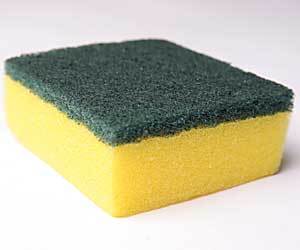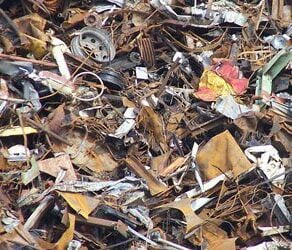
Table of Contents:
Dish sponges are often the dirtiest pieces in a kitchen. They often live next to the sink, the germiest place in the kitchen, and hold onto those germs and dirt creating a real health hazard. Sponges need to be sanitized at last every other day, and replaced every week or two for best protection against germs. Here is an easy way to sanitize your sponge and give it the longest life possible.
What You Will Need:
- Anti-bacterial dish detergent
- Hot water
- Microwave
- Bleach (optional)
- Tongs or oven mitts
The Cleaning Process:
- Begin by adding a few drops of anti-bacterial dish detergent to the hot water.
- Wash the sponge thoroughly by working the water through the sponge. This can be accomplished by squeezing the water through continually along with agitating it in the water.
- Rinse thoroughly with clean water.
- You can place your sponge in a bleach solution (1 tablespoon of bleach with 1 gallon of water) as well. This step is optional as the next step will also sanitize the sponge.
- Place the WET sponge in the microwave. You can place it in a dish of water, but it may not necessary.
- Microwave on high for 2 minutes. Monitor it carefully to watch for any signs of burning. If it appears to be burning the sponge, turn the microwave off immediately.
- When it is finished sterilizing in the microwave, let it set for a few minutes to cool off. It will be HOT!
- Remove it with a pair of tongs or oven mitts to protect your hands from burning.
- It is recommended that even with sterilizing, you should only use your sponge for a week or two before replacing.
Additional Tips and Ideas
- Keep two sponges in your kitchen at all times, one for the counters and one for the dishes.
- Sterilize your sponges after using them to clean up any dishes or work areas that contained raw meat.
- Do not place any metal sponges or scrubbers in the microwave. Simply use the bleach solution to sanitize.
- If odor is a problem, try spraying some vinegar on the sponge before microwaving.









Sponges need attention…frequently!
I keep a bottle of Clorox Clean Up under my sink and after each time I wash dishes, I clean the sink, dishrag and sponge with Clorox Clean Up. Works like a charm and keeps odor away.
My husband, a scientist, reminds me that those green scrubbers are what are often used in a lab to grow cultures. They are very perfect places for bacteria to grow and flourish.
I get my supply at the dollar store so throwing them away doesn’t feel “wasteful.”
How about putting them in the dishwasher on the top rack.
Or you can just throw it in the dishwasher. The super-heated water will kill off all the gross bacteria. It’s the heat that kills it, not soap or bleach.
How to clean a dish sponge: I have a much quicker and easier way. I simply place my dish sponge and dish brushes in the top tray of the dishwasher every time that I wash a load of dishes. The hot water combined with the bleach of the dish-washing soap are powerful disinfectants, making sponges fresh and safe.
My wife washes the sponges in in dishwasher. It also seems to sanitize well. Of course they have to be squeezed out, but otherwise, it works quite well.
I put my sponges in the dishwasher every time I run it. They come out clean and smell a whole lot better.
I throw mine in the dishwasher with the dishes or the washing machine with the towels.
After microwaving, any old food splatters in the microwave will be very soft and easy to wipe off. Two birds with one stone!
Can you also soak it in lemon juice? I thought I read someplace that the acid in the lemon juice will sterilize it, and also make it smell good.
Do most people replace their sponges every WEEK? Wow — I never knew that before! I usually use them for a few MONTHS before I change them for new ones!
I wash my sponges weekly in laundry detergent and bleach. I usually wash 3-4 of them in my clothes washer by themselves. Seems to work great on odor and germs.
At 15p for a pack of five, it’s no big deal to just replace these household petri dishes.
I just fill the small half of the sink with water, dish soap and Clorox, put all the dishrags, scrubbers and brushes in it, plus the drain screens, and leave them overnight. In the morning, I pull the drain plug and that cleans out the disposal too.
I don’t buy sponges; I use dish cloths and wash them with my towels and dish rags.
I put a few drops of Grapefruit Seed Extract on the sponge and let it soak in soapy water – the stuff is so powerful, it will kill all the bad bacteria without all the trouble of microwaving or dish-washing.
Pour some hydrogen peroxide and watch it bubble the bacteria away.
For the person who said, “I get my supply at the dollar store so throwing them away doesn’t feel “wasteful.””
What wasteful are you talking about? Not the impact that thousands of sponges have a day in landfills from people that throw them away ’cause there cheap or dirty. WHY NOT USE WARM WATER (95% of germs are killed by it) and save your money on dish soap; stop polluting and decreasing water supply.
Also, use dish towels, you don’t have to throw them out every week. People, please think about what your doing. You can save your wallet and the planet at the same time. What could be better? Thank you for your time – if this changes at least one person, and has them use water and dish towels, it will be good. Because I know how stubborn and stupid people are so I’m not expecting a majority turnaround. Oh and did you know that germs are good for you; they help your body get stronger. Research it, it will blow your mind. Everyone is becoming weaker from this germiphobe culture. Thank you once again for your time.
This message is addressed mostly to Wow. I agree that we need to be much more conservative with our resources. Properly cared for, sponges can and do last a long time (soap ’em, rinse ’em and boil every 3 days for 30 seconds). I prefer the good old dishcloth and just wash them with my towels. A capful (about 1/2 tsp.) of eucalyptus oil in the wash works just as well as bleach, isn’t as hard on the environment and doesn’t damage colors.
Some germs are good for us, we have thousands of little creatures living on our skin that actually protect us, the 99% germ-killing hand sanitizes are a big problem as they do not discriminate between the good and the bad bacteria. HOWEVER the bacteria that tend to grow in sponges, ie. e. coli, salmonella, and staphylococcus, among others, can be very dangerous. In a healthy person, you may just get a good bout of diarrhea, but to an elderly or very young person or someone with a compromised immune system, these bacteria can be very dangerous, even deadly. I agree that many are on the germaphobe kick generated by the media and advertising, but I also agree with using sanitary measures in my kitchen and bathroom. I try to do so in a way that has the least impact on the environment – lots of baking soda, lemon juice, salt, vinegar, supplies that are cheap to purchase and give great results without the toxic fumes of most commercial cleaners. AND using dishcloths and dish towels, taking good care of my sponges so that they last no matter how little I paid for them, etc.
Take care of our Earth; it’s the only one we have!
Funny… we replace our sponges every 6 months, never sanitize them, and I only rinse my hands (not wash off all the germs) and yet I never get sick. It’s not the germs that get you sick, your body has an immune system to kill off any foreign invaders and it needs practice. Focus on upping your immune system and you can live your life w/o Lysol or hand sanitizers and get sick less. E
I cannot believe the level of wastefulness I am reading in these posts. “I wash my dish sponges by themselves in the washer every week” etc. This is insane. What a huge waste of natural resources. Just drop the damn thing wet into the bucket of powder laundry detergent, whatever sticks is enough, squeeze it a few times, rinse, and it’s clean. Stop burning fossil fuels over a dish sponge.
Don’t fret about germy sponges. Just place them in the microwave for 30 seconds on high. The germs will be gone.
How about just throwing them away? Cleaning them seems like such a waste of time. You can get ’em for cheap.
It amazes me how much people dwell on germs. I use my sponges to rinse plates and to clean pots that I don’t want to go in the dishwasher. If the sponge is cleaning the pot, then it can’t be too dirty. It is soaked in hot water and soap. Relax! You aren’t going to die. The dishwasher idea sounds best for those concerned and to make them last longer before you need to throw them out. I truly believe that hot water and less chemicals is best. Most spray counters and tables, etc., with harsh chemicals and then thinking it is clean, put their food on it. If boiling water makes it safe to drink, then the same is true for anything that will clean with hot water. Use as few chemicals in our lives as possible and wash your hands and you will be fine.
Forget about dishwashers, bleach, hydrogen peroxides or dangerous chemicals. I agree with Mimi, throw it in the microwave – but I would do it for a full minute on high.
This is silly.
I keep two sponges around.
One washes dishes for 2-6 months depending on how dirty it gets, and then it goes into phase two: counter duty. No sterilization takes place til the sponge gets assigned to clean the counters with 409.
I also eat food slightly past expiration, and I routinely under-cook non-expired meats. I get sick maybe twice every three years.
I want to tell you all a story. My grandfather was a doctor, and he had a colleague who was deathly afraid of germs. He sanitized everything, kept his whole house sterile. He went through great pains to keep germs as far away from himself as he could. Know how he died? He caught something his immune system should have been able to handle. Unfortunately, it was too busy loafing around, munching potato chips, to be of any use.
Here’s another bit of info for all you germaphobes out there. An average American traveling to foreign countries will get sicker than a dog by eating some of the local cuisine. The locals are unaffected. Why? Because their immune systems are healthy and strong.
Vaccinations are just vials full of viruses. Sure, they’re neutered so they can’t hurt you much, but the basic principle behind them is that they give your immune system a workout and get it used to that particular virus.
Unless you’re immunodeficient, save medicines and disinfectants for when they’re really needed–illnesses with real potential for death or damage, and pools of chicken blood.
I spray a couple of sprays of Clorox Clean Up into the dishwater when hand washing. This disinfects the dishes, water, sponge and my fingernails. 🙂
I also do the same when I use the dishwasher.
I use one sponge, which I cut the corner off to differentiate it, to clean up nasty stuff.
The other sponge is used to clean dishes, etc.
Occasionally I’ll give the nasty sponge a rinse under the tap, and put the dish sponge in boiling water a couple of times. Easy.
I also dispose of the clean sponge every couple of months and get a new one.
Maybe I’m not reading properly… So there are a lot of people washing their sponges in the dishwasher… doesn’t that defeat the purpose of the sponge??? If you’re washing the sponge in the dishwasher, why aren’t you washing your dishes in there as well? I don’t know… Maybe it’s just me. 😉 I solely use my dishwasher as a dish rack, lol… It never gets turned on.
Wow I never knew I had to replace them every one or two weeks. :0 This caught me off guard.
I’ll just go for disinfecting the dish sponge and using it for a month. The nasty ones I use for countertops – I’ll throw away every two weeks.
We should never allow water to stay in a sponge; we should squeeze out after using.
Did someone really say they just rinse their hands?! Vomit! That is exactly why I need Lysol and hand sanitizer. So, when you go to the restroom, you just rinse?! That is outright nasty!!! If other people would be clean, I wouldn’t be so disturbed by germs. Sorry, rinsing does nothing.
Back to the point, I clean my sponge in the dishwasher as well. 🙂
America has practically sterilized everything from food to sponges. A little bit of germs are good for us to have good immunity. I clean my sponge in my dishwasher every 2-3 days. I don’t think we need to be overly cautious by using bleach or a microwave every time we use a sponge.
My tips to get the most out of your dish sponge:
1. Cut them in half before using and presto, you instantly double your sponge’s life.
2. Squeeze them out after using them and stand them on their small edge so that the maximum surface area is exposed. They’ll air dry much faster.
3. When the sponge starts to get a nasty smell — throw it in boiling water for about five minutes. (Better than microwaving — the smell is GONE from the sponge without making your microwave or house smell.)
4. When it’s just too dirty to use as a dish sponge anymore, take it to something else — your bathroom, your floors, or whatever dirty job you would throw a sponge away after anyway.
Heat kills the bacteria, not lemon juice or bleach. USDA recommends either a microwave or dishwasher, see here:
http://www.ars.usda.gov/is/pr/2007/070423.htm
I find many of these comments ludicrous, though well-intentioned. Each person naturally has a different point of view. I use my sponges until they fall apart over many years. Never thought of cleaning them since there’s dishwasher cleanser in them already. I got sick, I think once, in the last 20 years, and that was just a running nose. However, each person is different. Do what you think is best for your bio-system. To paraphrase Michael Douglas in Wall Street, “Dirt is good.” Not too much dirt, of course (I wouldn’t lick a New York sewer just to imbibe dirt!). But use common sense: the more dirt we imbibe, the stronger our defensive systems become. Ever hear of the boy in the bubble? Or the sci-fi film where nothing could kill the outer space monster except the common cold, because its system had never achieved immunity from it? That says it all.
I clean using soap, use the sponge, then clean the sponge again. I also use it on vegetables; cleaning it before and after just the same. When it gets old and floppy, I just use it to clean the bad areas like the sink and get a new one. Never had a problem doing this. My girlfriend screams at me for doing this. But her style makes no sense whatsoever. She’ll use the good one to clean, sometimes even the sink, then just throw it aside without cleaning it. Yes, I know this allows bacteria to colonize. Crazy.
Putting 3 tablespoons of vinegar and baking soda together and mix them well, then put your dish sponge in the mixture. Let it soak well and evenly, then it let dry out in the sunlight. This will kill all or any bacteria living on and/or in the sponge. This sterilizing method is much more efficient and safer for the environment. It is also a good method to save money and to stop being wasteful.
Very reasonable.
I am not afraid of bleach like some people seem to be. I wash dishes with sponges or sponge cloths, which are thin like dish rags, and every couple of days I fill the dish pan/sinks half way with water and a couple splashes of Clorox, throw in the sponges/brushes, let them sit for fifteen minutes and then drain. When you sanitize things in a bleach solution, you should not re-rinse because you are just undoing the sanitizing job the bleach just performed. Bleach turns into salt water and when it dries, the whole thing disappears. Google bleach sometime or go on Clorox’s website and read the many safe ways to use the product. As for worrying about excess germs, I don’t. Made it to 76 with no major damage, so guess I will continue on my way. 🙂
I am NOT a germaphobe and I am NOT a recycler of all things.
But on the other hand, I do believe in staying healthy; no need to challenge the immune system more when everything attacks it these days. And I am careful to conserve/recycle in a handful of things to make a difference.
As for eating food after the expiration date-just depends on what the food item is, how far past the expiration date and so on. But eating raw meat is just asking for an organism to setup house in your body. You may not feel the affects now, but getting older…
If you are using a dish washer, why use sponges? I agree with using a wash cloth.
And microwave ovens usually do NOT kill germs-especially in 30 seconds!
Take a microbiology class at your local college and be amazed!
We DO need to be exposed, to a degree, to a lot of germs in order to build up and keep our immune system functioning well. This indeed protects us from getting ill all the time. And that includes eating better food and not so much junk food-but even that is okay in moderation.
But, to purposely wipe germs all over the stove, counter-top, and so on is ridiculous.
As for not worrying about washing your hands with soap, using sponges for 6 moths and so on, do NOT forget that even if you do not get ill, you can make others ill. Not everyone has a healthy immune system because of genetics, an ailment they have, and so on. And not only could you give them something that will make them ill, we can all be carriers of a disease or organism that will make others ill, even if we are fine. When it comes to cooking for myself, I am not so worried because I know what everything is, comes from and so on. But when I cook for others, I make sure the kitchen environment is extremely clean.
We did a study in our microbiology class and out of ALL the cleaners out there, plain old bleach was the TOP germ killer of them all. Even beat the GermX that most hospitals use!!! That’s why they say hospitals, especially their floors are so infected, why not to go barefoot or in socks on a hospital floor and why so many people get staph infections after being in the hospitals. If everything were wiped down in bleach, would be much better.
Just like hand sanitizer-read up folks, most all of them do NOT kill the 99.9% germs as claimed. Most have nowhere near the amount of alcohol needed. You get your hands dirty, you squirt some sanitizer on your hands, wipe the germs ALL over your hands now, the liquid dries and you have happy little germs spread all over them now!
I have also found out that some are under the impression that when you wash your hands with soap and water, it kills germs. This is simply NOT true. The reason a doctor lathers before doing a procedure, not just washes the hands, is because the soap bubbles themselves, actually lift up the germs. In other words, the germs get caught on the bubbles and the water simply washes the germs down the sink. That’s why a sink, especially a drain is considered so unsanitary.
Economically, as well as hygienically, you cannot go wrong with a dish of bleach water and allow the sponge to soak in it and then rinse it a bit. A second alternative is to boil the sponges in water at 212ºF for SEVERAL minutes, not seconds. Even after that, then you can throw the sponge away after 6 months or so. Saves landfills, saves health, saves money, saves lives.
A tidbit for weighing the facts: If you want to find out why “X” is good for you, look it up. Just because it encourages you that “X” is great for you, be skeptical. Play the devil’s advocate and do another search with: why “X” is not good for you and weigh BOTH sides of the coin before making a decision. Example: If a person/company wants you to start eating grapefruit, they will tell you all the great stuff it does for you. So you do another search about why grapefruit is bad for you and you find out it interacts with meds you are taking or causes a liver problem or whatever.
You can find dozens, if not hundreds of websites telling you to microwave your sponge. And it sounds GREAT! But now that you “know” this, do another search that says, “Microwaves cannot kill germs in a sponge and read the real facts. The only way to know for sure if your mic is truly killing germs, and how long it really takes, is by having a black light and so on, to actually test your sponge. Be safe, not just for you, but for your guests, and just use the bleach or boiling method.
Or…if you don’t care about money and landfills, throw them away as soon as they are getting gnarly. That can be after one load of very dirty dishes, preparing chicken, and so on, or 1-2 weeks washing dishes that had all been rinsed prior to washing.